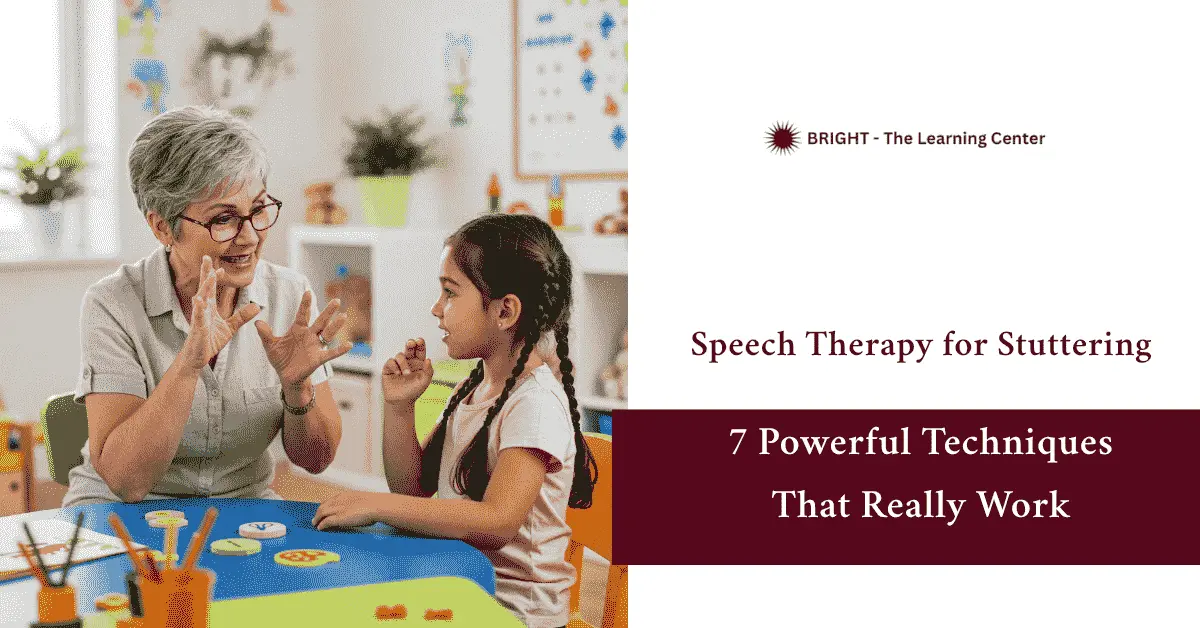Speech therapy for stuttering is a proven approach to help individuals speak more smoothly and confidently. This article explores causes, effective techniques, and how to choose the right therapist—guiding you toward clearer communication and lasting progress.
According to our expert, Dr. Akila Palani, a certified speech therapist with 24 years’ experience, effective stuttering therapy blends clinical skill with engaging, interactive methods. Her research on phonological awareness and work with children— including those with Autism and ADHD—supports using fun, practical tools to boost communication skills.
Table of Contents
What Is Speech Therapy for Stuttering?
Speech therapy for stuttering is a specialized treatment designed to help individuals gain smoother, more confident speech. It focuses on techniques that reduce disruptions in the flow of talking, such as repetitions or prolonged sounds, which commonly frustrate both children and adults. Through guided exercises and personalized strategies, therapy aims to improve communication skills, boost self-confidence, and enhance overall quality of life. Whether the stuttering is mild or severe, speech therapy provides effective tools to manage and often significantly reduce its impact.
Common Causes and Warning Signs
Stuttering usually emerges in early childhood during critical speech development stages. While many children experience brief speech hiccups, persistent difficulties may indicate a deeper issue. Common causes include genetics, delayed speech milestones, and challenges with coordinating speech muscles. Early warning signs to watch for are:
- Frequent repetition of sounds or syllables
- Noticeable hesitations or blocks while speaking
- Struggle or tension when trying to talk
- Delayed ability to form words and sentences compared to peers
Spotting these signs early is vital—timely intervention can greatly improve speech outcomes.
Effective Techniques to Improve Fluency
Speech therapy for stuttering employs proven strategies to help achieve smoother speech. Key techniques include:
- Fluency shaping: Training to slow down speech and control rhythm
- Breathing exercises: Managing breath flow to reduce tension
- Easy onset: Starting sounds gently to prevent blocks
- Self-monitoring: Increasing awareness of speech patterns
These approaches work together to build confidence and improve communication over time.
What to Expect in Your First Session
Your first speech therapy session for stuttering usually starts with a thorough evaluation by a certified speech-language pathologist. This helps tailor a treatment plan specific to your needs. Key steps include:
- Discussing your speech history and challenges
- Setting therapy goals together
- Observing your natural speech patterns
- Trying introductory exercises to assess fluency
This initial session lays the groundwork for your personalized journey toward clearer, more confident speech.
How Caregivers Can Support Progress
Caregivers play a vital role in reinforcing speech therapy outside the clinic. Consistent support at home helps turn skills into lasting habits. Practical ways to assist include:
- Encouraging regular practice of therapy exercises
- Creating a patient, stress-free speaking environment
- Modeling slow, clear speech during conversations
- Celebrating small improvements to boost confidence
Active involvement makes a real difference in the success of speech therapy for stuttering.
Choosing the Right Speech Therapist
Selecting the right speech therapist is crucial for effective stuttering treatment. Look for professionals who are:
- Certified speech-language pathologists (SLPs) with specialized training
- Experienced in working with stuttering and fluency disorders
- Skilled in personalized therapy approaches that fit your needs
- Recommended by trusted sources or reputable clinics
Taking time to find the right expert ensures you get the best support on your speech journey.
Benefits of Early Intervention
Starting speech therapy for stuttering early can significantly improve outcomes. Early support helps children develop stronger speech skills and confidence while reducing frustration. Key benefits include:
- Faster improvement in speech fluency
- Prevention of negative emotional effects like anxiety
- Better communication skills during critical development phases
- Greater long-term success in managing stuttering
Prompt action gives individuals the best chance for clear, confident speech throughout life.
FAQs
What do speech therapists do for stuttering?
They assess speech patterns and teach techniques to improve fluency and confidence.
What age should you start speech therapy for stuttering?
Therapy is most effective when started early, often between ages 2 and 6.
How to fix stuttering in speech?
Through targeted therapy techniques like controlled breathing, slow speech, and consistent practice.

